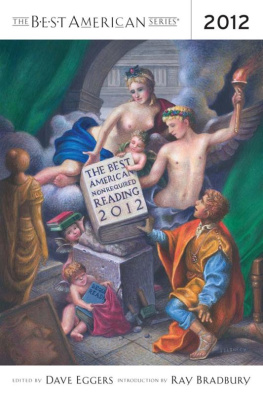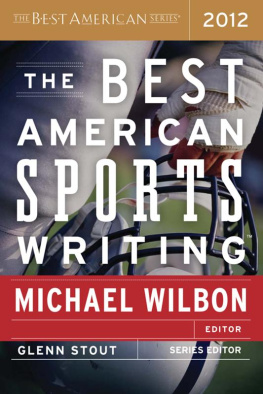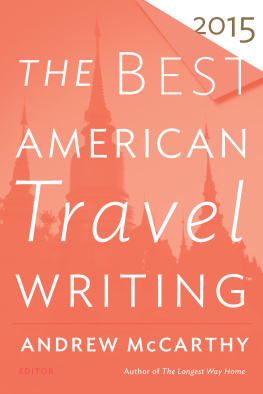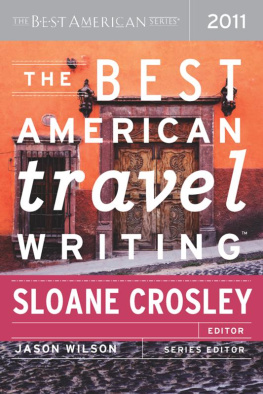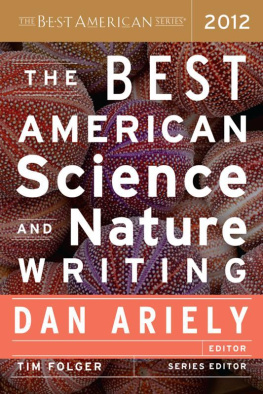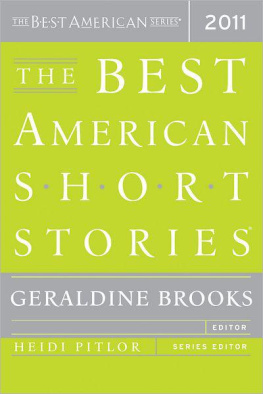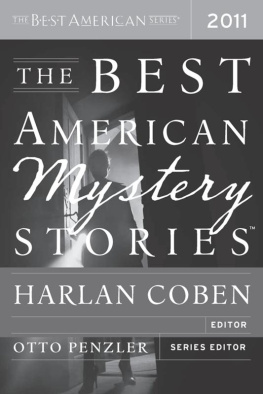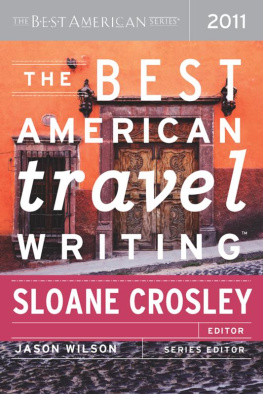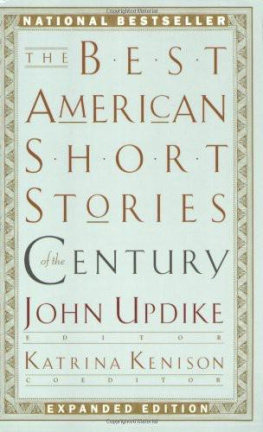Dear Reader,
The Best American series is the premier annual showcase for the country's finest short fiction and nonfiction. This special e-book contains eleven selections from the following 2011 editions:
The Best American Short Stories edited by Geraldine Brooks
The Best American Essays edited by Edwidge Danticat
The Best American Mystery Stories edited by Harlan Coben
The Best American Science and Nature Writing edited by Mary Roach
The Best American Sports Writing edited by Jane Leavy
The Best American Travel Writing edited by Sloane Crosley
Each volume's series editor selects notable works from hundreds of magazines, journals, and websites. The guest editor then chooses the best twenty or so pieces to publish. This unique system has made the Best American series the most respectedand most popularof its kind.
We hope you enjoy the brilliant writing presented in this unique edition and invite you to delve further into the individual works.
Mariner Books
Houghton Mifflin Harcourt
Boston New York
The Best American Short Stories 2011
Selected from
U.S. and Canadian Magazines
by G ERALDINE B ROOKS
with H EIDI P ITLOR
With an Introduction by Geraldine Brooks
Mariner Books
HOUGHTON MIFFLIN HARCOURT
BOSTON NEW YORK 2011
Contents
Foreword ix
Introduction by Geraldine Brooks xiii
CHIMAMANDA NGOZI ADICHIE. Ceiling 1
from Granta
MEGAN MAYHEW BERGMAN. Housewifely Arts 14
from One Story
TOM BISSELL. A Bridge Under Water 32
from Agni
JENNIFER EGAN. Out of Body 56
from Tin House
NATHAN ENGLANDER. Free Fruit for Young Widows 74
from The New Yorker
ALLEGRA GOODMAN. La Vita Nuova 87
from The New Yorker
EHUD HAVAZELET. Gurov in Manhattan 96
from TriQuarterly
CAITLIN HORROCKS. The Sleep 104
from The Atlantic Fiction for Kindle
BRET ANTHONY JOHNSTON. Soldier of Fortune 119
from Glimmer Train
CLAIRE KEEGAN. Foster 136
from The New Yorker
SAM LIPSYTE. The Dungeon Master 163
from The New Yorker
REBECCA MAKKAI. Peter Torrelli, Falling Apart 179
from Tin House
ELIZABETH MCCRACKEN. Property 193
from Granta
STEVEN MILLHAUSER. Phantoms 210
from McSweeney's
RICARDO NUILA. Dog Bites 231
from McSweeney's
JOYCE CAROL OATES. ID 244
from The New Yorker
RICHARD POWERS. To the Measures Fall 262
from The New Yorker
JESS ROW. The Call of Blood 276
from Harvard Review
GEORGE SAUNDERS . Escape from Spiderhead 300
from The New Yorker
MARK SLOUKA. The Hare's Mask 323
from Harper's Magazine
Contributors' Notes 331
Other Distinguished Stories of 2010 345
Editorial Addresses of American and Canadian Magazines Publishing Short Stories 349
Housewifely Arts
Megan Mayhew Bergman
FROM One Story
I AM MY OWN HOUSEWIFE, my own breadwinner. I make lunches and change light bulbs. I kiss bruises and kill copperheads from the backyard creek with a steel hoe. I change sheets and the oil in my car. I can make a pie crust and exterminate humpback crickets in the crawlspace with a homemade glue board, though not at the same time. I like to compliment myself on these things, because there's no one else around to do it.
Turn left, Ike says, in a falsetto British accent.
There is no leftonly a Carolina road that appears infinitely flat, surrounded by pines and the occasional car dealership billboard. I lost my mother last spring and am driving nine hours south on I-95 with a seven-year-old so that I might hear her voice again.
Exit approaching, he says from the back seat. Bear right.
Who are you today? I ask.
The lady that lives in the GPS, Ike says. Mary Poppins.
My son is a forty-three-pound drama queen, a mercurial shrimp of a boy who knows many of the words to Andrew Lloyd Webber's oeuvre. He draws two eyes and a mouth on the fogged-up window.
Baby, don't do that unless you have Windex in your backpack, I say.
Can you turn this song up? he says.
I watch him croon in the rearview mirror. He vogues like Madonna in his booster seat. His white-blond shag swings with the bass.
You should dress more like Gwen Stefani, he says.
I picture myself in lam hot pants and thigh-highs.
Do you need to pee? I ask. We could stop for lunch.
Ike sighs and pushes my old Wayfarers into his hair.
Chicken nuggets? he asks.
If I were a better mother, I would say no. If I were a better mother, there would be a Ziploc baggie in a cooler with a crustless PB&J, a plastic bin of carrot wedges and seedless grapes. If I were a better daughter, Ike would have known his grandmother, spent more time in her arms, wowed her with his impersonation of Christopher Plummer's Captain von Trapp.
How many eggs could a pterodactyl lay at one time? Ike asks.
Probably no more than one, I say. One pterodactyl is enough for any mother.
How much longer? Ike asks.
Four hours.
Four hours till what?
You'll see, I say.
What I'm having trouble explaining to Ike is this: We're driving to a small roadside zoo outside of Myrtle Beach so that I can hear my mother's voice ring through the beak of a thirty-six-year-old African gray parrot, a bird I hated, a bird that could beep like a microwave, ring like a phone, and sneeze just like me.
In moments of profound starvation, the exterminator told me, humpback crickets may devour their own legs, though they cannot regenerate limbs.
Hell of a party trick, I said.
Our house has been for sale for a year and two months and a contract has finally come in, contingent on a home inspection. The firm I work for has offered to transfer me to Connecticuta paralegal supervisory position in a state where Ike has a better chance of escaping childhood obesity, God, and conservative political leanings. I can't afford to leave until the house sells. My realtor has tried scented candles, toile valances, and apple pies in the oven, but no smokescreen will detract from the cricket infestation.
They jump, the realtor said before I left town with Ike. Whenever I open the door to the basement, they hurl themselves at me. You'll never pass a home inspection, he said. They're like spiders on steroids. Do something.
The exterminator already comes weekly, I said. And I've installed sodium vapor bulbs.
I'll see you Sunday, the realtor said, walking to his compact convertible, his shirt crisp and tucked neatly into his pressed pants. I'll come over for a walk-through before the inspection.
That night Ike and I covered scrap siding in glue and flypaper and scattered our torture devices throughout the basement, hoping to reduce the number of crickets.
You're coming down later to get the bodies, Ike said. Because I'm not.
He shivered and stuck out his tongue at the crickets, which flung themselves from wall to ledge to ceiling.
What if we live here forever? he asked.
People used to do that, I said. Live in one house their entire life. My mother, for instance.
I pictured her house, a two-bedroom white ranch with window boxes, brick chimney, and decorative screen door. The driveway was unpavedan arc of sand, grass, and crushed oyster shells that led to a tin-covered carport. Growing up, there was no neighborhoodonly adjoining farms and country lots with rambling cow pastures. People didn't landscape in fancy ways then. Mom had tended her azaleas and boxwoods with halfhearted practicality, in case the chickens or sheep broke loose. The house, recently bought by a corporate real estate firm, was empty now, a tiny exoskeleton on a tree-cleared lot next to a Super Walmart.
Next page


